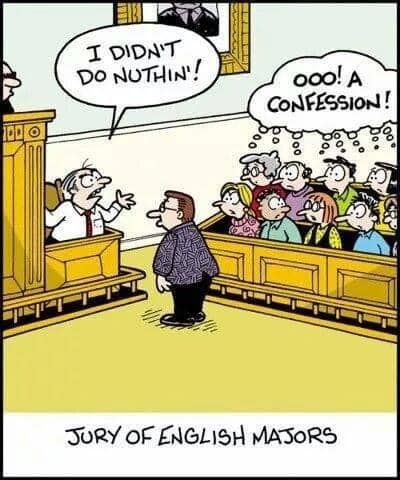We get a bad rap, those of us with English degrees. Quite apart from the current assault on the humanities by the UK government, we’re said to be horribly woke and fairly humourless. I’m probably not going to do much to counter that last point with what I’m about to say, but one thing’s for sure: we’re far less judgemental than we’re made out to be.
The other day, my dad forwarded me a pretty typical characterisation of English graduates as grammar sticklers in the form of the cartoon below:

I can’t pretend I didn’t roll my eyes so hard that I pulled a small muscle (I’m 35, it’s the time of life when tiny movements can now result in chronic injury). But while I heal, let’s redress the balance and think about what a jury of English majors would actually think in this case – or at least, what I *hope* a bunch of our English Language and Linguistics graduates would think.
Most would likely accept without a blink that the defendant in the box has a negative concord grammar (common in many Englishes, arguably available in all Englishes) and would keep listening intently to the content of the speaker’s utterances, as it is that, rather than their grammar, that is important in considering their case. They would also be well aware of the negative connotations that many hearers have of speakers of negative concord varieties of English – that they’re less intelligent, less educated, and even less friendly. They themselves may not be immune to these prejudices depending on how they’ve been brought up, but their Linguistics degree will have taught them enough to check their assumptions and prejudices and park them.
Some might dwell a little longer, to consider whether there are any other features of the speaker’s grammar that might be different from their own. It might be the case that there are, and that the listener isn’t sure how to interpret the speaker’s utterance, which could lead to misunderstandings and an unfair hearing. This isn’t mere speculation or doommongering, but was demonstrated in painstaking detail by Taylor Jones and colleagues for speakers of African American English in (majority-white-staffed) courtrooms in Philadelphia. So hopefully, our Linguistics graduate on the jury would check their understanding to ensure a fair hearing for our negative-concord-using defendant.
But one thing’s for sure – they’ve taken enough sociolinguistics and syntax classes to know that you don’t get no double negation reading here.